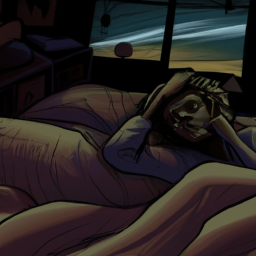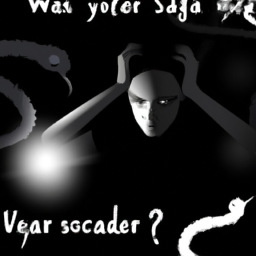Having experienced the trauma of vivid dreams myself, I comprehend their unsettling quality. It is not a trivial thing to awaken soaked in sweat, tormented by visions of death and destruction. These occurrences are not just unpleasant; they can evoke feelings of anxiety, making the idea of going back to sleep terrifying.
But what do these dreams actually mean? Are they just random thoughts or could they be a sign of something more serious?
In this article, we will explore the world of violent dreams and their possible causes. We’ll delve into common themes in violent dreams, underlying mental health conditions that may contribute to them, coping strategies for when they occur, and prevention techniques to reduce the likelihood of experiencing them altogether.
Whether you’re looking for answers for yourself or a loved one, this article aims to provide information that empowers readers to take control of their mental wellbeing and seek help if necessary.
Key Takeaways
- Violent dreams can indicate underlying psychological issues, ranging from stress and anxiety to unresolved trauma or repressed emotions.
- Common themes in violent dreams include being chased or attacked, witnessing violence, and being the perpetrator of violence.
- Coping mechanisms such as relaxation techniques, self-care, and seeking professional help can help manage violent dreams.
- Medications, substance abuse, sleep disorders, and environmental factors can all play a role in causing or exacerbating violent dreams.
Definition of Violent Dreams
Violent dreams, defined as vivid and disturbing dream sequences involving aggression or physical confrontations, can be indicative of underlying psychological issues. Causes may range from stress and anxiety to unresolved trauma or repressed emotions. Effects can include sleep disturbances, irritability, and even physical symptoms such as headaches or muscle tension.
However, there are management strategies and techniques that can help alleviate the intensity and frequency of violent dreams. These may include relaxation techniques like meditation or deep breathing exercises before bedtime, keeping a dream journal to identify patterns or triggers, seeking therapy to address underlying psychological issues, and avoiding certain foods or activities before bed that may disrupt sleep.
It’s important to recognize that violent dreams are a common experience for many individuals, but seeking professional help when necessary can provide valuable insight into one’s mental health status. With that said, let’s explore common themes in violent dreams.
Common Themes in Violent Dreams
As someone who frequently experiences violent dreams, I’ve noticed that there are a few common themes that tend to recur.
The first is being chased or attacked by an unknown assailant, which can be terrifying and often leaves me feeling helpless.
Another theme is witnessing violence, whether it be in the form of a horrific accident or a brutal crime.
Finally, there’s the unsettling experience of being the perpetrator of violence myself – something that always leaves me feeling guilty and disturbed upon waking up.
These three themes are just a few examples of the types of violent dreams that many people have experienced at some point in their lives.
Being Chased or Attacked
When we have dreams of being chased or attacked, our subconscious may be trying to alert us to a perceived threat in our waking life. Being chased in a dream can indicate that we’re avoiding something important or running away from a problem. Similarly, being attacked can symbolize feeling vulnerable and powerless.
These violent dreams may also be linked to anxiety. Dealing with anxiety is crucial to prevent these types of nightmares from occurring frequently. Some tips include practicing relaxation techniques such as deep breathing exercises and meditation, maintaining a healthy lifestyle through regular exercise and proper nutrition, and seeking support from friends or professionals if needed.
It’s important to recognize the difference between nightmares and violent dreams – while both can be disturbing experiences, nightmares often involve feelings of fear without necessarily involving violence.
Moving on to the next subtopic about witnessing violence, it’s important to note that this type of dream can be particularly distressing for some individuals.
Witnessing Violence
Observing aggression in a dream can be an overwhelming experience and may leave one feeling uneasy upon waking up. It’s not uncommon for individuals to witness violent acts in their dreams, whether it be physical altercations or verbal arguments.
Here are four things to consider when reflecting on the impact of witnessing violence in your dreams:
-
It may trigger feelings of anxiety: Witnessing violence can activate our fight or flight response, leading to increased feelings of anxiety even after we wake up.
-
Coping mechanisms can help: Finding healthy ways to cope with the emotions that arise from violent dreams, such as talking to a therapist or using relaxation techniques, can reduce the negative impact on mental health.
-
It could be linked to past trauma: For some people, witnessing violence in their dreams could be related to past traumatic experiences they have endured.
-
Seek professional help if needed: If violent dreams are causing significant distress or impacting daily life, seeking professional help from a therapist or doctor may be necessary.
It’s important to note that being the perpetrator of violence in our dreams can also have an impact on our mental health and well-being.
Being the Perpetrator of Violence
Being the perpetrator of violence in our dreams can evoke intense emotions and leave us feeling disturbed upon waking up. As someone who’s experienced this, I understand how unsettling it can be to have a dream where you are the one causing harm to others.
Perpetrator psychology is complex and can vary from person to person, but some common themes emerge in these types of dreams. One factor that may contribute to violent dreams where we are the perpetrator is societal impact. We live in a world where violence is prevalent, whether through media or personal experiences. This exposure can subconsciously influence our thoughts and feelings, leading to violent dreams as a means of processing and coping with this information.
Additionally, unresolved conflicts or feelings of anger towards others may manifest in our dreams as acts of violence towards those individuals. Understanding these underlying factors can help us work towards addressing any unresolved issues and promoting emotional well-being.
It’s important to note that while being the perpetrator of violence in our dreams may be unsettling, it doesn’t necessarily mean we have violent tendencies in real life. There are many different factors that can contribute to experiencing violent dreams, including physical health, mental health conditions such as PTSD or anxiety disorders, medications, substance use, and more. By identifying potential causes and seeking appropriate support when needed, we can work towards reducing the frequency and intensity of these types of dreams.
Causes of Violent Dreams
I want to explore the causes of violent dreams, which can be attributed to a number of factors.
Firstly, stress and anxiety are known to cause vivid and intense dreams that can turn violent.
Secondly, trauma and PTSD have been linked to nightmares that often involve violence or aggression.
Thirdly, certain medications or substance abuse may affect one’s REM sleep cycle, leading to disturbing and violent dreams.
Lastly, sleep disorders such as sleep apnea or restless leg syndrome have also been associated with violent dreams.
Stress and Anxiety
When we’re stressed or anxious, our mind can create violent dreams that leave us feeling scared and uneasy in the morning. These dreams are often a manifestation of our subconscious fears and worries, and can be triggered by anything from work stress to relationship problems.
Coping mechanisms such as meditation, deep breathing exercises, or journaling before bed can help alleviate some of this stress and reduce the likelihood of having violent dreams. Self care is also an important aspect of managing stress and anxiety, which can in turn lead to fewer violent dreams.
Taking time for oneself through activities such as exercise, hobbies, or spending time with loved ones can help reduce overall levels of stress. By prioritizing self care and finding healthy ways to cope with stressors in our lives, we may find ourselves waking up feeling more rested and less haunted by nightmares.
While stress and anxiety are common triggers for violent dreams, trauma and PTSD can also play a significant role. Understanding the causes behind these types of dreams is key to managing them effectively and finding ways to improve sleep quality overall.
Trauma and PTSD
If you’ve experienced trauma or PTSD, your subconscious may be processing those events through your dreams, potentially causing discomfort and hindering restful sleep. It’s common for individuals who have gone through trauma to experience vivid and violent dreams that reenact the event. These dreams can cause intense fear, confusion, and distress, making it difficult to fall asleep or stay asleep throughout the night.
As a part of PTSD recovery, healing from trauma requires addressing these nightmares and finding ways to cope with them. One approach is through therapy, where a mental health professional can help identify triggers that lead to violent dreams and provide tools for managing them. Additionally, participating in relaxation techniques such as meditation or yoga can also promote better sleep hygiene and reduce the frequency of disturbing dreams.
Moving onto the subsequent section about medications and substance abuse, it’s important to note that while these options may provide temporary relief from symptoms like nightmares, they should always be used under the guidance of a healthcare provider.
Medications and Substance Abuse
You may be curious about how medications and substance abuse can impact your sleep and overall health. Prescription drugs, such as antidepressants and antipsychotics, have been known to cause vivid dreams or nightmares. This is because these medications affect the chemicals in our brain that control our sleep patterns.
In some cases, medication management may be necessary to adjust dosages or change the type of medication being taken. Substance abuse treatment can also have an impact on dream patterns. Withdrawal from drugs or alcohol can cause intense dreams that may be violent or disturbing.
However, with proper treatment and support, individuals in recovery are more likely to experience restful sleep and fewer violent dreams over time. As we move into the next section on sleep disorders, it’s important to remember that addressing any underlying issues with medication management or substance abuse treatment is crucial for improving overall sleep quality and reducing violent dreams.
Sleep Disorders
Imagine struggling to fall asleep every night or waking up multiple times throughout the night, leaving you feeling exhausted and unrefreshed in the morning. Sleep disorders such as sleep paralysis and night terrors can cause violent dreams, leading to a restless and disturbed sleep. Sleep paralysis is a condition where one is unable to move or speak while falling asleep or waking up, causing intense fear and anxiety. Night terrors, on the other hand, are episodes of sudden awakening from deep sleep with feelings of extreme terror and confusion.
These conditions can lead to violent dreams where the individual experiences vivid and disturbing images that can sometimes be physically harmful. To help cope with these conditions, it is important to seek medical attention and practice good sleep hygiene habits such as avoiding caffeine before bedtime, maintaining a regular sleep schedule, and creating a relaxing environment for sleeping. Understanding these conditions can provide relief for those who suffer from them, allowing for better restful sleep without violent dreams.
As we transition into the subsequent section about underlying mental health conditions, it’s important to note that some individuals may have underlying mental health issues that contribute to their sleep disorders. Seeking professional help for any potential mental health concerns may also alleviate symptoms of sleep disorders and ultimately lead to better overall well-being.
Underlying Mental Health Conditions
Feeling trapped in your own mind and experiencing violent dreams may be a manifestation of underlying mental health conditions that require professional attention. Mental health stigma has long been prevalent in society, making it difficult for individuals to seek help without feeling judged or ashamed. However, seeking professional help is crucial in addressing any underlying mental health issues that may be contributing to the violent dreams.
If you’re experiencing violent dreams, it’s important to know that you’re not alone, and there are ways to cope with them. Here are three things to keep in mind:
- Talking about your experiences with someone you trust can provide relief and support.
- Practicing relaxation techniques, such as deep breathing or meditation, can calm the mind and reduce stress levels.
- Incorporating regular exercise into your routine can also improve sleep quality and overall mental well-being.
By utilizing these coping strategies, you can begin to address the root causes of your violent dreams and work towards better mental health.
Coping Strategies for Violent Dreams
When experiencing unsettling or distressing dreams, it can be helpful to use relaxation techniques to calm the mind and body. This can include deep breathing exercises, meditation, or progressive muscle relaxation. By focusing on slow, deliberate breathing or tensing and releasing different muscle groups, the body can physically relax and reduce feelings of anxiety.
Journaling is another effective coping strategy for processing violent dreams. Writing down details about the dream and how it made you feel can help identify any underlying emotions or triggers that may be contributing to recurring nightmares. Additionally, expressing these thoughts and feelings in a safe space such as a journal can provide a sense of release and closure.
By practicing these strategies regularly, individuals may find relief from violent dreams and feel more in control of their mental health. However, if dreams continue to cause significant distress or interfere with daily life, seeking professional help may be necessary for further support and guidance.
Seeking Professional Help
When I started experiencing violent dreams, I decided to seek professional help. Therapy and counseling were the first options that came to mind.
My therapist helped me understand the root of my dreams and gave me coping mechanisms to deal with them. Medication was also prescribed to help me sleep better at night, and sleep studies were conducted to determine if there were any underlying medical issues causing my dreams.
Therapy and Counseling
If you’re experiencing violent dreams, therapy and counseling can be a helpful way to explore the underlying causes and find strategies for coping. One of the benefits of therapy is having a safe space to talk about your experiences without fear of judgement or criticism. A therapist can help you identify patterns in your dreams, as well as any triggers or stressors that may be contributing to their occurrence.
Finding the right therapist is important when seeking help with violent dreams. Look for someone who specializes in dream analysis or trauma therapy, as they may have more experience working with these types of issues. It’s also essential to feel comfortable with your therapist, so don’t hesitate to schedule consultations with a few different providers before making a decision.
Once you’ve found a good match, therapy can be an effective tool for managing and reducing violence in your dreams. In addition to therapy, medication can also be used to treat violent dreams.
Medication
Therapy and counseling are great ways to manage violent dreams, but sometimes medication may be necessary. Managing medication can be a daunting task as there are possible side effects that need to be considered. However, when used correctly, medications can help alleviate the symptoms of violent dreams and improve overall sleep quality.
Here are some things to consider when managing medication for violent dreams:
- Consult with a healthcare professional before starting any new medication
- Be aware of potential side effects and let your doctor know if you experience any
- Follow dosage instructions carefully
- Do not mix medications without consulting a healthcare professional
- Keep track of how the medication affects your sleep patterns
Taking medication can be an effective way to manage violent dreams, but it’s important to take precautions and work closely with a healthcare professional.
In the next section, we’ll explore another option for understanding and treating violent dreams through sleep studies.
Sleep Studies
A sleep study can offer valuable insights into the causes of violent dreams. During a sleep study, doctors monitor brain waves and other vital signs to determine what happens in the body during different stages of sleep. By analyzing these results, they can identify any underlying factors that may be contributing to violent dreams.
One such factor is poor sleep hygiene or an unfavorable sleep environment. For example, if your bedroom is too noisy or bright, you might experience more disruptive dreams than if you slept in a quiet, dark room. Additionally, consuming caffeine or alcohol before bed could interfere with your ability to enter deep REM (rapid eye movement) sleep cycles where most dreaming occurs.
Addressing these environmental factors can improve not only the quality of your sleep but also reduce the frequency and intensity of violent dreams. By taking steps to optimize our sleeping environment and habits, we can decrease the likelihood of experiencing violent dreams.
In the next section on prevention techniques, we’ll examine some practical strategies for improving our overall sleep health and reducing episodes of vivid dreamscapes.
Prevention Techniques
You can try practicing relaxation techniques before bed to help prevent violent dreams. Deep breathing exercises, meditation, and yoga are all effective ways to calm your mind and body before sleep. Additionally, practicing lucid dreaming may also help reduce the occurrence of violent dreams. Lucid dreaming involves becoming aware that you are dreaming while still remaining in the dream state, allowing you to control the outcome of your dreams.
It’s important to note that prevention techniques may not always be effective for everyone and it’s important to speak with a healthcare professional if you continue to experience violent dreams. In fact, discussing your concerns with a doctor or therapist is a crucial step in addressing this issue and finding appropriate treatment options.
How to Talk to Your Doctor About Violent Dreams
Discussing your nighttime experiences with a medical professional can lead to helpful solutions for peaceful sleep. If you’re experiencing violent dreams, it’s important to talk openly with your doctor about your symptoms and any potential triggers that might be causing these dreams. Here are four things to consider when discussing this topic with your doctor:
-
Be honest and open: Your doctor needs all the information they can get in order to properly diagnose and treat your condition.
-
Bring a list of medications: If you’re taking any medications that could potentially trigger these dreams, make sure to bring a list of them with you.
-
Consider medication alternatives: Depending on the severity of your symptoms, there may be medication alternatives that can help without causing additional side effects.
-
Discuss any underlying mental health conditions: Violent dreams can sometimes be related to underlying mental health conditions such as anxiety or PTSD, so make sure to discuss any other symptoms you may have been experiencing.
By talking openly with your doctor about your violent dreams and considering medication alternatives, you’ll be taking an important step towards finding relief from these unsettling experiences.
In the next section, we’ll explore additional resources for help and support in dealing with violent dreams.
Additional Resources for Help and Support
There are many resources available for support and guidance when dealing with unsettling nighttime experiences. Support groups and online forums can be great places to connect with others who have gone through similar experiences and offer a sense of community. Many people find it helpful to share their stories, express their emotions, and receive validation from others.
Additionally, connecting with a therapist can provide personalized support and guidance in navigating violent dreams or nightmares. A therapist can help identify underlying causes of these dreams, develop coping strategies, and work towards resolution. With the right support, it’s possible to lessen the impact of violent dreams on daily life and improve overall well-being.
Remember that you don’t have to go through this alone – there are resources available to help you along the way.
Frequently Asked Questions
Can violent dreams be a sign of physical health problems?
As someone who has experienced violent dreams, I can say that they may not necessarily be a sign of physical health problems. However, they could indicate underlying mental health issues and should be discussed with a healthcare professional. Physical symptoms such as stress or sleep disorders could also contribute to these types of dreams.
Are there any medications that can cause violent dreams?
Medications for sleep disorders can trigger violent dreams. It’s important to speak with a healthcare provider about potential side effects and explore alternative treatments. Serving ourselves means taking care of our physical and mental health.
Can violent dreams be indicative of repressed trauma?
Repressed trauma interpretation of violent dreams has psychological implications, potentially indicating unresolved trauma. Understanding the root cause can lead to healing and improved mental health. It’s important to seek professional help for support.
Can recurring violent dreams lead to PTSD?
Recurring violent dreams can be a symptom of PTSD, but not necessarily a cause. Prevention strategies include stress management and healthy coping mechanisms. Psychological therapies such as EMDR and CBT can also aid in recovery.
Are there any alternative therapies for coping with violent dreams?
To cope with violent dreams, dream journaling and relaxation techniques can be helpful. A study found that those who practiced relaxation techniques experienced a decrease in nightmare frequency by 75%.
Conclusion
In conclusion, violent dreams can be a troubling experience that many people face. While they’re not always indicative of an underlying mental health condition, it’s important to take them seriously and seek help if necessary.
Coping strategies, such as relaxation techniques and therapy, can be effective in managing the symptoms of violent dreams. For example, Sarah had been experiencing recurring nightmares where she was being chased by a masked figure. The dreams were so vivid and intense that they left her feeling anxious and fearful throughout the day.
With the help of a therapist, Sarah was able to identify the root cause of her nightmares and develop coping strategies to manage them. Through techniques such as mindfulness meditation and journaling, Sarah was able to reduce the frequency and intensity of her violent dreams.
If you’re struggling with violent dreams, it’s important to remember that there’s help available. Don’t hesitate to reach out to a mental health professional who can provide guidance on how best to manage your symptoms. With proper support and treatment, you can overcome your nightmares and enjoy peaceful sleep once again.









